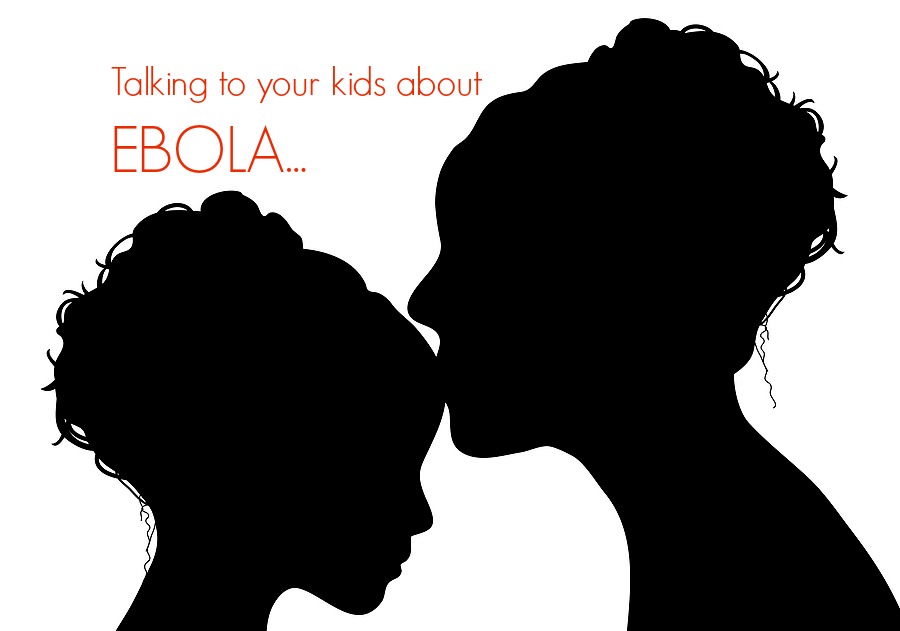If you're new here, you may want to subscribe to my RSS feed. Thanks for visiting!
By Daisy Luther
You can’t turn on the television or radio lately without hearing a breathless report about Ebola. Since most of our kids don’t live in bubbles, they’ve been hearing the same things you are. If you’re worried, concerned, or downright afraid, can you imagine how a child must feel? To allay that fear, it might be time for an age-appropriate talk with them about Ebola.
I’ve always been of the opinion that if my child is old enough to ask the question, they are old enough to receive an age-appropriate answer. When my daughters were small, I’d filter the answer down to one sentence. If they were satisfied with that, I left it alone. If they asked further questions, I went into more detail. They know how much information they can handle, and I feel like, as parents, we are obligated to teach them. When they asked things I didn’t know the answer too, we always looked it up, which I felt was another teachable moment: the answers are there if you know where to look.
This also holds true with deep questions like ones about war, sex, crimes, and disease.
If you are a person who doesn’t want your child brainwashed with the government-sanctioned dogma about things like freedom and morals, why would you want them to learn about a potential pandemic from those sources?
What you say to your kids is entirely dependent on their maturity levels. My oldest daughter could have learned every last detail at the age of 7 and would have taken it in stride. My youngest, however, would have found any details utterly terrifying at that young age. She would have immediately imagined a grim scenario in which every person she knew, the family dog, and the neighbor’s cat, all succumbed to a bloody gruesome death in the backyard by the trampoline. For her, I would have been more vague in my answers – not dishonest, but not going into details.
[page_section template=’3′ position=’default’]
Do you want to prep but you’re not sure how to get started?

[thrive_link color=’teal’ link=’https://preppersuniversity.com/learn-about-the-prepping-intensive-courses/’ target=’_blank’ size=’big’ align=’aligncenter’]Which Prepping Intensive Course Is Right For Me?[/thrive_link]
[/page_section]
Last night, my youngest daughter asked me about Ebola. She’s 14, so she has heard things on the radio, seen things on the internet, and discussed it in health class at school. She had heard about the fact that the patient in Dallas had been around some children, and that those children had gone to school and had been around other children. Since she was raised in a house full of skeptics, she wanted to know the “real” story.
Following are the questions she asked, and the answers I gave her. If I expect my kids to always tell me the truth, how can I set an example of being less than truthful with them? You can water down the facts while still being honest. You can add or take away from these answers based on what you feel your kids should know and can handle.
What is Ebola?
Ebola is an illness that is caused by a virus. That virus attacks the body in a way that it causes bleeding, or hemorrhaging. In fact, another name for it is hemorrhagic fever. It’s a very bad illness, and most of the cases are in Africa. They don’t have good medical care there, so most of the people who caught it have died.
How do you know if you have Ebola or if someone else has it?
In the early stages, when they are first contagious, you can’t always tell right away. It could just be the flu, because it’s a headache, fever, and achy body. This is the bad part – it takes a few days of being sick to realize that you might have it.
The symptoms are:
- Fever
- Severe headache
- Joint and muscle aches
- Chills
- Weakness
- Nausea and vomiting
- Diarrhea (may be bloody)
- Red eyes
- Raised rash
- Chest pain and cough
- Stomach pain
- Severe weight loss
- Bleeding, usually from the eyes, and bruising (people near death may bleed from other orifices, such as ears, nose and rectum)
- Internal bleeding
When you first get sick, you just continue to get worse, until the symptoms are very severe. Within a day or two of getting sick, it will become obvious that this isn’t the flu. But you have to remember, so far, there’s only one person in America who has been diagnosed with Ebola. You’re far more likely to catch a cold or the flu than you are to catch Ebola.
How do people catch Ebola?
The answer to that question is changing. Initially, doctors said that you had to come in direct contact with another person’s body fluids, and that those fluids had to directly contact your mucous membranes to be absorbed into your body and make you sick.
Body fluids are things like: vomit, urine, feces, saliva, blood, and tears.
Your mucous membranes are things like your eyes, your mouth, your privates, and the inside of your nose.
Now, however, they’re saying that the Ebola virus can live outside the body on something like a doorknob. This is scarier because it makes it easier for it to pass from one person to another. This video is from a movie, but it shows how a virus can be transmitted.
How do we keep from getting Ebola?
The good thing is, if you know how it is transmitted, you can keep yourself safer. You see how the sick person touched all of those things on the bus, and was coughing? Every place he touched and everywhere his cough went could potentially have the live virus.
This is why you should frequently wash your hands. You should try to limit touching the things that everyone else touches. You should resist touching your face, too, because that’s where most of your accessible mucous membranes are.
If Ebola was really bad, we would not be going out like that, but right now, it isn’t really bad. These precautions can help keep you healthier from all kinds of things, though, and not just something awful like Ebola. It can keep you from catching colds or the flu, also. These are just good habits to have.
Other habits that keep you healthy are good nutrition and regular exercise. The healthier your body is to start with, the better it will be at fighting off illness.
What if Ebola gets really bad here, like it did in Africa?
There are several reasons it’s less likely to be as bad here as it is in Africa.
First of all, people in America are better nourished and probably healthier to start off with than those in Africa. We have safe, clean water to drink and access to good food. We also have reliable sanitation and access to good medical care. When you are healthier, your body is better able to resist getting sick, or to heal itself if you do get sick.
Secondly, it’s important to remember there is ONLY one confirmed case so far in the United States. That doesn’t mean it’s going to stay that way, but so far, out of all of the people in our country this very minute, only one person has been found to have Ebola. Lots of people are panicking and going to the hospital, but so far, the tests for those people have been negative for Ebola. When people get scared, they tend to panic and their mind goes immediately to the worst case scenario. (This article is constantly being updated regarding potential cases across the country.)
Finally, if it does get bad and we begin to see cases all over the country, or in our area, we will take steps to keep ourselves safe. This is one of the reasons we prep. If we needed to, we could go for many months without needing to go out and go to the store. We have everything we need to stay home and keep ourselves safe and healthy. There are already plans in place for our preparedness group to go into lockdown for as long as it takes for things to get under control. The absolute number one way to prevent getting sick, if it was really bad, would be for all of us to stay away from anyone who could be sick. (This article provides information about going into family lockdown, as well as checklists of supplies you may need.)
Are you worried about Ebola?
No, I wouldn’t say I’m worried. I’d say that I’m aware. It’s like if you heard there could be a bad storm coming. You’d get things ready, and you’d pay attention to the news, but you wouldn’t be actually concerned until your area began to become overcast and windy. You’re smart to be aware of things that could potentially happen, because then you can be prepared if they do. Worrying is different because it just makes you stressed and unhappy.
Prepper Night at the Movies
For some kids, the information above will be enough. Other kids will want to know more. Only you can judge the appropriate amount of information for your child. Sometimes fictional depictions of a similar situation can be educational and can open the door for more conversations. Some children would find this even more frightening, so these programs are not appropriate for all kids.
Of the programs below, my favorite is Contagion. I like how the character of the father keeps his daughter safe by going home and staying home. (I’m not so thrilled about the vaccine being the saving grace, but that’s Hollywood for you.) Some young people might enjoy a pandemic marathon, with frequent discussion breaks throughout on whether or not the depictions or accurate, or what you’d do differently. Definitely emphasize that this is fiction!
Some suggestions are:
World War Z (Blu-ray + DVD + Digital HD)
More resources about Ebola preparedness:
The Spread: Here’s Where People Are Being Tested for Ebola (with Results)
Updated: Prepping for an Ebola Lockdown
The Prepper’s Blueprint: The Step-By-Step Guide To Help You Through Any Disaster
The Pantry Primer: How to Build a One Year Food Supply in Three Months
“Like” Pandemic Watch on Facebook

















Thanks Daisy for this food for thought on how to tell my daughter who is almost 9. I have explained to her that just as she gets bags together of her favorite toys if we think a tornado is a possibility (as I did as a child, we live in the Midwest)so too do we prepare for other things. I think of it as insurance, you hope you never need it but are happy it’s there if you do.
Virtually everything being said about contracting Ebola was preached about AIDS. First was contagion by exchanging body fluids, now its door knob. Can toilet seats be far behind?
Our borders are wide open and being over-run by illegals from 3rd world countries. A tyrannical unconstitutional Police State has been built around us. Our Bill of Rights has been lost. And we are living in fear of Ebola? That’s exactly what the government wants. This is the same White House that boasted, “You never let a serious crisis go to waste. And what I mean by that it’s an opportunity to do things you think you could not do before.”
If you want your kids to be able to recognize potential symptoms in themselves and others, it’s a bit important to remember one of the earlier “unique” symptoms: Hiccups. If you’ve got “the flu” AND consistent hiccups, then it’s time to get checked. If they see someone a little sick with the hiccups, stay away if they can. It’s one of the earliest odd symptoms that don’t generally occur with more mainstream illnesses. Half of the confirmed victims in this outbreak have had hiccups.